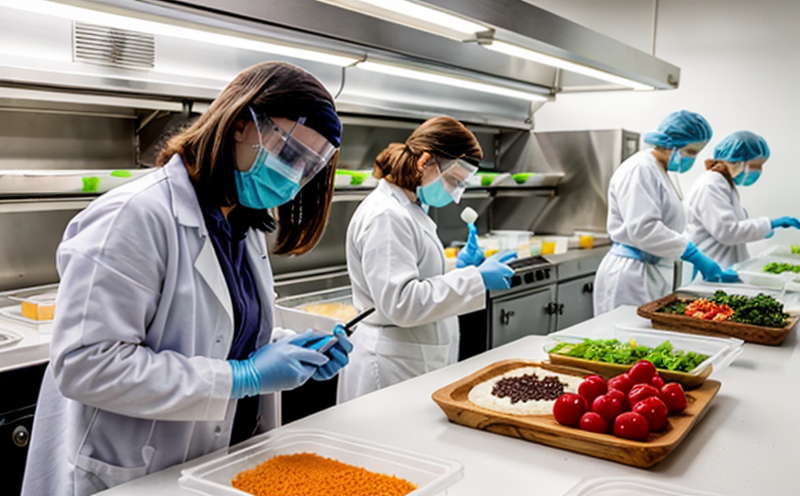ISO 15213 Clostridium spp. Detection Testing
The ISO 15213 standard is pivotal in ensuring food safety by providing a standardized method for detecting the presence of Clostridium spp., which includes organisms like Clostridium perfringens and Clostridium botulinum, both known for their potential to cause serious health issues. This testing procedure is crucial in the food industry where any contamination can lead to severe public health risks.
The standard outlines a series of steps designed to identify these pathogens, ensuring that food products meet safety standards and are fit for consumption. The process starts with the selection of appropriate sampling methods, which should be tailored to the specific product type (e.g., canned foods, meat products). Once samples are collected, they undergo rigorous pre-treatment processes in our laboratory, including homogenization and dilution.
The actual detection involves several steps: inoculation, incubation, and identification. Our laboratories use advanced microbiological techniques such as selective media for enrichment and isolation of suspected Clostridium spp., followed by biochemical tests to confirm the presence of these organisms. This process ensures that no contamination goes undetected.
The significance of this testing cannot be overstated, especially in high-risk products like canned goods or smoked meats where anaerobic conditions can favor the growth of Clostridium spp. Our service ensures compliance with international standards and regulatory requirements, thereby providing peace of mind to our clients regarding their product safety.
Our team of experts uses state-of-the-art equipment and follows strict protocols to ensure accurate and reliable results. The testing process is not only a safeguard for consumer health but also helps in maintaining the reputation of food producers by ensuring that their products meet the highest quality standards.
International Acceptance and Recognition
The ISO 15213 Clostridium spp. Detection Testing is widely recognized and accepted across the globe, particularly in countries with stringent food safety regulations such as the United States, European Union, China, and Japan. The standard is part of a suite of guidelines that aim to enhance global food safety through standardized methodologies.
Compliance with ISO 15213 not only ensures adherence to international standards but also facilitates easier trade between countries by meeting regulatory requirements for import and export. This recognition enhances the credibility of testing results, making it easier for businesses to meet their commitments to consumers and regulatory bodies alike.
The standard's acceptance is further bolstered by its alignment with other international food safety standards such as HACCP (Hazard Analysis and Critical Control Points) and GMP (Good Manufacturing Practices). By integrating ISO 15213 into these frameworks, businesses can ensure that their operations are not only safe but also efficient and compliant.
The widespread adoption of this standard reflects a global commitment to food safety. It underscores the importance of scientific rigor in testing procedures, ensuring that no risks are overlooked when it comes to public health. This international acceptance is crucial for maintaining trust between producers, regulators, and consumers worldwide.
Environmental and Sustainability Contributions
The ISO 15213 Clostridium spp. Detection Testing service contributes significantly to environmental sustainability by promoting safer food production practices that reduce the risk of contamination. By ensuring that food products are free from harmful pathogens like Clostridium spp., this testing service helps prevent foodborne illnesses, which in turn reduces healthcare costs and improves public health.
Moreover, adherence to international standards such as ISO 15213 fosters a culture of continuous improvement within the food industry. This encourages businesses to adopt more sustainable practices that minimize waste and resource use throughout the production process. For instance, by identifying and eliminating contamination early in the supply chain, companies can reduce the amount of product that needs to be discarded.
The testing service also plays a vital role in supporting sustainable development goals by promoting safe and nutritious food systems. By ensuring that food products meet high safety standards, this service helps to build trust between producers and consumers, which is essential for long-term sustainability.
Our laboratory's commitment to environmental responsibility extends beyond just the testing process itself. We strive to minimize our carbon footprint by optimizing energy usage in our facilities and reducing waste through recycling programs. This holistic approach ensures that we contribute positively to both public health and environmental conservation efforts.
Use Cases and Application Examples
- Canned Foods Production: Canned goods are particularly susceptible to Clostridium spp. contamination due to their anaerobic environment. Regular testing ensures that products meet stringent safety standards.
- Meat Processing Industries: Meat products, especially those subjected to smoking or curing processes, require thorough testing to prevent the growth of harmful pathogens like Clostridium botulinum.
- Packaged Foods: Testing is essential for ensuring that packaged foods remain safe from contamination during storage and distribution.
- Restaurant Chains: Regular testing helps restaurant chains maintain their reputation by ensuring consistent food quality and safety across all locations.
- Import/Export Companies: Compliance with international standards like ISO 15213 is crucial for importers/exporters to meet regulatory requirements and ensure smooth trade processes.
The results of these tests are not just a compliance requirement but also serve as valuable data points that can inform improvements in production methods and product design. By identifying potential risks early, businesses can implement preventive measures, thereby enhancing overall food safety standards.





